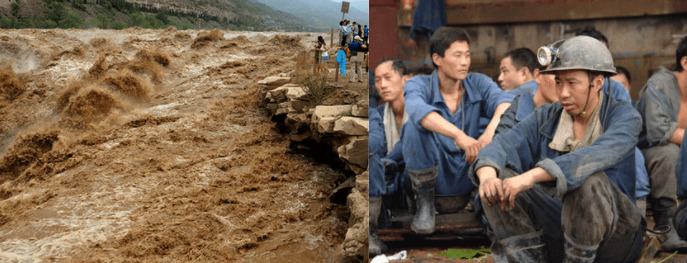China is desperately trying to get its hands on as much coal as it can. Having waged a self-destructive trade war against Australia, which has seen the paper dragon cease coal imports from the down under country, China is now reeling under an intense coal crisis that has triggered an energy shortage across the country. The crisis is so dire that even metropolises like Shanghai and Beijing are staring at an unforgiving power crisis in the eye. The rolling blackouts have already started showing effects in at least four districts of the capital city of Beijing. But China came up with an idea to somehow lessen its coal woes.
Chinese authorities have ordered dozens of coal mines to expand production amid a nationwide energy crunch. According to the state-run Securities Times, dozens of mines in China’s Inner Mongolia – which is a major coal-producing region – were instructed to increase their capacity by more than 98 million tonnes. The 72 mines in Inner Mongolia were asked to “accelerate the release” of production capacity.
In a similar order, the National Development and Reform Commission of China had recently told mining companies that accidents will no longer result in the shutdown of nearby mines for safety inspections. This essentially means that mining companies are now free to prioritise output ahead of the safety of the miners. However, no matter what China does, the universe seems to be conspiring against the CCP to plunge China into further darkness.
Rains Wreak Havoc in Coal-Producing Regions of China
China has further extended a production halt at mines and chemical factories in its top coal-producing province, after a week of torrential rain that ravaged the area. Shanxi province suspended output at 60 coal mines. According to Bloomberg, the halt in Shanxi adds fresh pressure on a nation already struggling with an energy shortage that has led to the rationing of electricity for factories and even caused blackouts in homes.
Heavy rainfall earlier last week led to collapses and landslides in many cities in the province, causing fatalities. The disaster prompted a response that also saw work at 1,035 construction sites halted and 166 scenic spots closed in the region.
Essentially, at a time when China had asked domestic coal miners to astronomically raise their output levels, the province which is a top coal supplier has been battered by torrential rain, landslides and the kind. Mines have been shut, which means coal production out of Shanxi province has taken a massive hit. And now, the effects of this toll will become manifest across China, as the country plunges into further darkness.
China’s Tremendous Coal Shortage
Coal provides half of China’s energy needs. So, the Chinese power sector is unsurprisingly reeling under the pressure of dipping coal supply. Also, industrial demand for coal remains high, and China’s extensive network of steel mills and other coal-based industries faces a very real threat of existence in lack of coal supply. However, if China is unable to supply coal for the generation of power, one can only imagine how industries must be reeling under an intense coal crunch, which is why the country’s Aluminium industry has come on the verge of a collapse.
Read more: Winter is coming for China. Quite literally!
Given China’s dismal situation when it comes to coal supplies, and the winter months only approaching with every passing day, the people of China must brace themselves for an extremely chilly and unforgiving winter. Last year too, the adverse effects of rising coal prices in China were starkly visible during the winter months. Many Chinese cities went dark since December 2020 itself, when lights went out and restrictions were imposed on the use of heating devices.
At the end of June this year, coal enterprises nationwide had stored about 50 million tons of coal, a year-on-year decrease of 26%. Nationwide, the total amount of coal stored in major ports was 62.98 million tons, a year-on-year decrease of 8.3%, while the coal-fired power plants throughout China stored about 110 million tons, a decrease of 21 million tons year-on-year, and a stock which can be used for only about 18 days straight.
On the other hand, in the first half of the year, the country’s total electricity consumption increased by 16.2% year on year. To make matters worse for the CCP, the imbalance between supply and demand has directly pushed up the price of thermal coal.
Now that the universe seems to be working against China, leading to an unprecedented exacerbation of its woes, it would be interesting to see how the Communist nation tries to overcome the variety of odds it faces, to ensure at least some supply of electricity to people and industries around the country.
